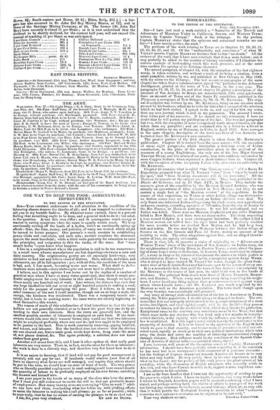ONE WAY TO HELP THE POOR: AGRICULTURAL IMPROVEMENT.
TO THE EDITOR OF THE SPECTATOR.
SIR-Your constant endeavours to call attention to the condition of the labouring classes deserve the thanks of all; and I am tempted to endeavour to aid you in my humble fashion. By whatever cause excited, there is a general feeling that something ought to be done, and a general wish to do it : but what, i is the question. About this men differ; and n consequence much energy is wasted in curing symptoms when the cause is equally within reach. We keep Continually cutting off the heads of a hydra, which as continually spring up afresh : thus, the time, money, and patience, of many are wasted, which might be turned to better purpose. One person's remedy consists in establishing penny-clubs and coal-clubs, and such aids; another considers the allotment system the most beneficial ; while a third waits patiently for education to raise the principles, and emigration to thin the ranks, of the mass. But "duos crescit herba "-you know what happens.
I live in a neighbourhood where the population is said to be too nutnerons- in a small town whence manufactures are fast departing-between a corn and dairy country. The neighbouring gentry are all especially kind-nay, very attentive to find out and relieve cases of distress. Here, schools, and clubs, and allotments, are all in full operation : yet, with all this, the condition of the mass is bad, and, I fear much, becoming worse and worse. What shall we de ?- institute more schools-more clubs-give out more land in allotments ?
I believe, and in this opinion I am borne out by the replies of a number of practical men whom I have at many times questioned, that there is ample pro- fitable employment for every labourer in this small Union, though we have at tones nearly one hundred out of work. Last winter, the distress was such that one large landholder laid out seven or eight hundred pounds in making a road, solely for the purpose of' employing the poor. Here I believe, as in many other instances of the sort I coubl mention, though not on so large a scale, the energy, the kindness was misdirected. There was a temporary benefit cer- tainly, but it leads to nothing more: the same wants are already beginning to show themselves this winter.
The reason of much of this misdirection of kind intentions is, that the land- holders are not generally educated so as to know the good they can do by at • tending to their own interests. Here the rents are generally low, and the smallest possible number of labourers is employed on each farm. If the land- owners would ride over their tenants' farms, they afield see that two labourers might be employed profitably where one now is ; and two ought to be employed to do justice to the land. Here is work constantly recurring, paying landlord, and tenant, and labourer. But the landlord does not observe that the ditches are not cleaned out, fences made good, weeds kept down, dung made the most 04 wet places drained, &c. The agent probably, a solicitor, dues not know rushes from good grass. Another evil arises from this, and I hear it often spoken of, that really good labourers are very scarce. There is, in fact, no education for them as labourers : i
the work is done n a slovenly way, and therefore very few know how to do it well.
It is an axiom in farming, that if land will not pay for good management it certainly.will not pay for bad. If landlords would observe (and tirat of' all /earn to observe) what farms are well managed, and require that others should be pat in like trim, we should hear no more of want of work. The very person who so liberally provided employment in road 'making could have caused double the quantity of labour to be profitably employed on his own farms; enriching the tenants and himself also.
I see your paper in the hands of so many of the class who have the power, that I trust you will endeavour to excite the will to find out profitable means of employment. How many brawny arms are now crying " Give us work !" while we run here and there, overlooking what lies before us, with piddling efforts to assist the labourer in making his small pittance go as far as possible ; while he says truly, that he has no means of earning the pittance to be so eked out.
























 Previous page
Previous page